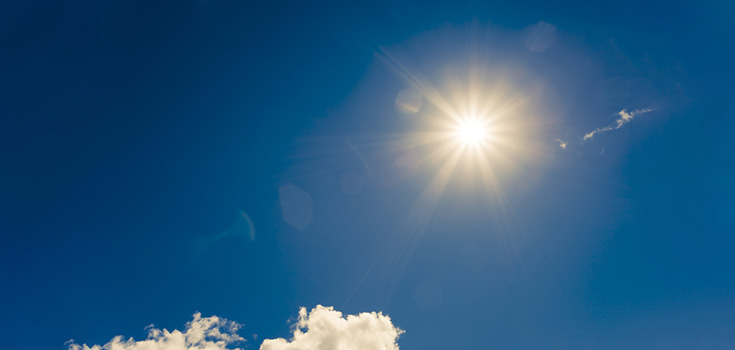Sun Exposure Can Protect Against Skin Cancer, Study Says

If you make your living off of treating people with melanoma, you might (really, might) know a thing or two about skin cancer. Dr. Angus Dalgleish says he used to advise people slather on the sunblock and avoid the sun like vampires. But now, his tune has changed and he has started advising his patients differently. The crux of his advice: reduce your cancer risk by increasing your sun exposure.
It all boils down to vitamin D.
Our body requires the sun to produce vitamin D; that’s why it’s called the sunshine vitamin. The sun is the absolute best source of vitamin D. And, Dalgleish says, vitamin D is one of the best weapons against skin cancer.
His interest in the vitamin D–cancer connection began when he read that researchers at Leeds University discovered low vitamin D levels to be a major risk factor for melanoma. In a world where we were told the sun caused this deadly form of skin cancer, the research was groundbreaking.
Dr. Dalgleish began testing his patients’ vitamin D levels and found something remarkable. While he expected some to be deficient, he found nearly all of them were deficient in vitamin D. Remember, these were melanoma patients—people already fighting the disease.
“If we supplement people who are low they may do better than expected. I wouldn’t be a bit surprised if vitamin D turns out to be more useful in improving outcomes in cases of early relapse than drugs costing £10,000 a year,” said Dalgleish. “I spent a decade studying interferon for which the NHS paid £10,000 annually per patient for years for very little benefit. Vitamin D is much more likely to give a benefit in my view.”
Now, his patients supplement with vitamin D. And Dalgleish himself does too—about 1,000 IU three times each week. (A much higher dose can be taken).
An industry has been built off of scaring us into thinking the sun will hurt us. This couldn’t be further from the truth. Certainly, going out in the heat of summer and getting blistery-burnt isn’t good for you, and we aren’t suggesting it is. But, moderate exposure to the sun isn’t only good for you, it could keep you healthy and cancer-free.
Additional Sources:

Thanks for the article. But you are making one very dangerous mistake: sun-screen/block. There are NUMEROUS carcinogens in these creams! You're better off to cover your nose with piece of wet paper!
Where is the link to the study?
The original article appears on the Mail Online website here: http://www.dailymail.co.uk/health/article-1390243…
Hope that clears up any confusion as to whether or not NaturalSociety supports using carcinogenic sunscreen as well. We are familiar with the dangers of synthetic sunscreens.
The real cause of much of skin cancer is quite simple; transfats and other man-made or oxidized junk fats such as processed vegetable oils replacing good natural fats, including cholesterol, in our diet. If you are not getting enough good fats your body may incorporate the junk fats in your skin cells. The junk fats will not provide the natural UV protection good fats will.
Of course high levels of anti-oxidants are still required to protect against ANY oxidation.
1000 iu three times a week does not sound enough, to me. Everything hinges on the resultant blood levels, of course. You need to aim for 70-90 ng/ml, anything less and vit D will not be able to do its job properly. I would think that at least 5000 iu per day is necessary, whether from the sun or from a D3 supplement is immaterial.
I am interested that the Vit D/cancer project was abandoned for "technical reasons". I suspect that this is code for "If we continue with this, the cancer industry stands to go out of business". Technical reasons or not, the simple fact is that an intake of D at the level I suggest will reduce the rate of breast cancer metastasis by 800%, and it is the metastasis which kills rather than the primary lesion.
This gentleman should do considerably more than merely thinking that the cancellation of the project was "a mistake". He is colluding with the forces of evil by accepting the diktat of the industry which presumably is funding him.
I think the "Low Vit D levels plus melanoma" apparent paradox is explained quite simply by realising that it is incautious exposure to u/v which generates the melanoma, ie before the vit D levels have risen to protective amounts.
So the answer is equally simple. Do not go out into the sun for lengthy periods at first. Build up your exposure day by day. A quarter hour initially, depending on basic skin colouration, ie fair skinned people should be extra cautious. If you do not burn, then 20 minutes the following day, etc.
In cool climates, as soon as people see the sun, they tend to lie in it all day because it is such a treat, but this is not a good idea.
Great article. Although I am the owner of a sun protection company, I am a great believer in getting sun. My current theory is to stay out long enough to bag some rays but not get a tan.
In response to Lisa – Think noseguard. No chemicals
As I get older, I wish I had protected myself better. I'd rather take Vitamin D and stay protected. What I do though is to put on my sunscreen around 10:00 in the morning. I have maximum coverage during the height of the sun. I figure later in the day I still enough coverage to protect me while getting some D.